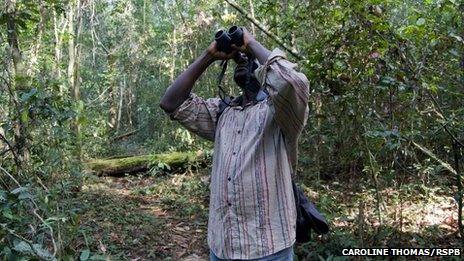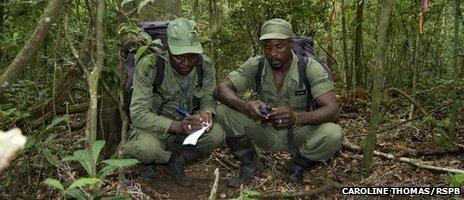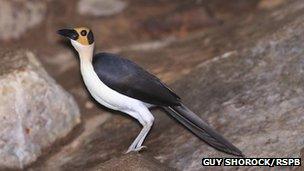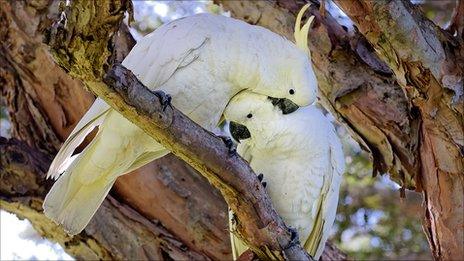From war to peace: Sierra Leone eyes bird-watching money
- Published

Sierra Leone is trying to change its image as a war-torn country by promoting ecotourism, writes journalist Paige McClanahan at the launch of the new Gola Rainforest National Park.
If you are looking to plan a bird-watching holiday, Sierra Leone might not be the first destination that jumps to mind. But that could change soon, if the government of this small West African nation gets its way.
Earlier this month, Sierra Leone opened the Gola Rainforest National Park, a 71,000-hectare protected area that is home to more bird species than can be found breeding in all of the UK.
The government hopes that the new park might help nature-loving tourists see beyond the battered image that defines the country overseas.
The reason for that image is a brutal 11-year civil war which claimed the lives of tens of thousands of people. But Sierra Leone has been at peace since the conflict ended in 2002.
"The great news is that despite the area being one of the worst hit during the war, the biodiversity survived relatively intact," said Jonathan Barnard, the head of the tropical forest unit at the Royal Society for the Protection of Birds, which has been doing conservation work in the Gola region since 1989.
The park is Sierra Leone's largest remaining piece of the Upper Guinea Forest Ecosystem, a region that the environmental group Conservation International has identified as one of the world's critical biodiversity hotspots.
The new national park is home to over 500 butterfly species, 300 bird species and 45 species of mammals. More than two dozen of those animals are under threat globally, including the pygmy hippo, the Diana monkey, the chimpanzee and the white-necked picathartes - a charismatic bird that the government has picked as the park's official symbol.
'Rich flora and fauna'
The government hopes that such species will lure wildlife enthusiasts from overseas.

Few tourists visit Sierra Leone, even though it is beautiful
The national park "is already receiving a modest number of adventurous tourists", Sierra Leone's President Ernest Bai Koroma said at the official opening of the park.
"With further development, ecotourism will continue to grow and generate economic benefits for the country."
A few walking trails have been set up inside the national park, and more are on the way. Soon tourists may be able to take canoe rides down the Mano River and go on guided nature walks to spot nesting birds.
But tourism-wise, there is still a long way to go.
The national park, in the Eastern Province along the border with Liberia, has only a couple of very basic lodges for visitors, and it takes six hours of driving - the last two on very rough roads - to reach the park from the capital, Freetown.
Not even 100 tourists visited the Gola Rainforest in the last year. Few people outside the country have even heard of it.
Cecil Williams, the general manager of Sierra Leone's National Tourist Board, called Gola Forest an "ideal attraction" given its rich flora and fauna.
"The difficulty I see is accessibility," Mr Williams said. "But in the next five to 10 years' time, all of these infrastructure problems will have improved."
A more stubborn obstacle might be the country's international reputation.
Many in the West still see Sierra Leone as a war-zone filled with blood diamonds and child soldiers, an image that seems to have been cemented by the 2006 film Blood Diamond, which starred Leonardo DiCaprio.
'Quality tourism'
That negative image "isn't as strong as it was five or six years ago," said Bimbola Carroll, who runs the Freetown-based tour company Visit Sierra Leone.

There are about 300 bird species in the park
"It's gradually getting better, but it's still there… Bad news stays in your head a bit longer."
The country attracted just 7,700 leisure visitors in 2010, according to data from the National Tourist Board.
That figure is expected to reach 10,000 this year.
But that still leaves Sierra Leone far behind countries like nearby Senegal, which welcomed nearly 1 million tourists in 2008.
The government is betting that ecotourism could be the way to boost Sierra Leone's tourist numbers.
In 2012, the Tourist Board will dole out grants to improve the facilities at five ecotourism destinations around the country, including River Number Two Beach, which is where the famous "Taste of Paradise" Bounty Bar advert was filmed.
At this early stage, the aim is to attract a modest number of tourists who will make multiple visits and who will recommend the country to their friends back home, Mr Williams said.
"We would rather go for quality tourism than quantity tourism."
- Published5 April 2018
- Published2 September 2011
- Published16 September 2011

- Published8 December 2011